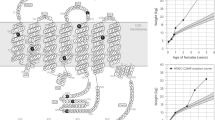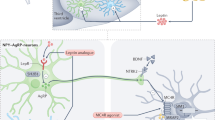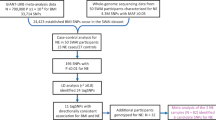Abstract
Melanocortin-4 receptor (MC4R) mutations are the most common known cause of monogenic obesity and an important contributor to polygenic obesity. MC4R mutations with partial or total loss of function, as well as the variant rs17782313 mapped near MC4R, are positively associated with obesity. MC4R is involved in the leptin–melanocortin signalling system, located in hypothalamic nuclei, that controls food intake via both anorexigenic or orexigenic signals. Impairment in this receptor might affect eating behaviours. Thus, in the case of MC4R mutation carriers, obesity could be related, at least partly, to inadequate control over eating behaviours. Many published studies address eating behaviours in MC4R mutation carriers. Most studies focus on binge eating disorder, whereas others examine various aspects of intake and motivation. Up to now, no evaluation of this literature has been performed. In this review, we examine the available literature on eating behaviours in carriers of MC4R mutations and variant rs17782313 near MC4R gene. We address binge eating disorder, bulimia nervosa, mealtime hyperphagia, snacking, psychological factors, satiety responsiveness and intake of energy and macro/micronutrient. In a small number of studies, MC4R mutations seem to impair eating behaviours or motivation, but no clear causal effects can be found in the balance of the evidence presented. Improvements in methodologies will be necessary to clarify the behavioural effects of MC4R mutations.
This is a preview of subscription content, access via your institution
Access options
Subscribe to this journal
Receive 12 print issues and online access
$259.00 per year
only $21.58 per issue
Buy this article
- Purchase on Springer Link
- Instant access to full article PDF
Prices may be subject to local taxes which are calculated during checkout
Similar content being viewed by others
References
OMS. Obésité et surpoids Aide mémoire N°311. Available at http://www.who.int/mediacentre/factsheets/fs311/fr/index.html. 2010.
Tan K, Pogozheva ID, Yeo GSH, Hadaschik D, Keogh JM, Haskell-Leuvano C et al. Functional characterization and structural modeling of obesity associated mutations in the melanocortin-4 receptor. Endocrinology 2009; 150: 114–125.
Wang ZQ, Tao YX . Functional studies on twenty novel naturally occurring melanocortin-4 receptor mutations. Biochim Biophys Acta 2011; 1812: 1190–1199.
Tao YX . Molecular mechanisms of the neural melanocortin receptor dysfunction in severe early onset obesity. Mol Cell Endocrinol 2005; 239: 1–14.
Farooqi IS, Keogh JM, Yeo GSH, Lank EJ, Cheetham T, O'Rahilly S . Clinical spectrum of obesity and mutations in the melanocortin-4 receptor gene. N Engl J Med 2003; 348: 1085–1095.
Hainerova I, Larsen LH, Holst B, Finkova M, Hainer V, Lebl J et al. Melanocortin-4 receptor mutations in obese Czech children: studies of prevalence, phenotype development, weight reduction response, and functional analysis. J Clin Endocrinol Metab 2007; 92: 3689–3696.
Lubrano-Berthelier C, Dubern B, Lacorte JM, Picard F, Shapiro A, Zhang S et al. Melanocortin-4 receptor mutations in a large cohort of severely obese adults: prevalence, functional classification, genotype-phenotype relationship, and lack of association with binge eating. J Clin Endocrinol Metab 2006; 91: 1811–1818.
Lubrano-Berthelier C, Durand E, Dubern B, Shapiro A, Dazin P, Weill J et al. Intracellular retention is a common characteristic of childhood obesity-associated MC4R mutations. Hum Mol Genet 2003; 12: 145–153.
Miraglia DG, Cirillo G, Nigro V, Santoro N, D'Urso L, Raimondo P et al. Low frequency of melanocortin-4 receptor (MC4R) mutations in a Mediterranean population with early-onset obesity. Int J Obes Relat Metab Disord 2002; 26: 647–651.
Geller F, Reichwald K, Dempfle A, Illig T, Vollmert C, Herpertz S et al. Melanocortin-4 receptor gene variant I103 Is negatively associated with obesity. Am J Hum Genet 2004; 74: 572–581.
Loos RJF . Recent progress in the genetics of common obesity. Br J Clin Pharmacol 2009; 68: 811–829.
Stutzmann F, Vatin V, Cauchi S, Morandi A, Jouret B, Landt O et al. Non-synonymous polymorphisms in melanocortin-4 receptor protect against obesity: the two facets of a Janus obesity gene. Hum Mol Genet 2007; 16: 1837–1844.
Young EH, Wareham NJ, Farooqi S, Hinney A, Hebebrand J, Scherag A et al. The V103I polymorphism of the MC4R gene and obesity: population based studies and meta-analysis of 29 563 individuals. Int J Obes 2007; 31: 1437–1441.
Hinney A, Bettecken T, Tarnow P, Brumm H, Reichwald K, Lichtner P et al. Prevalence, spectrum, and functional characterization of melanocortin-4 receptor gene mutations in a representative population-based sample and obese adults from germany. J Clin Endocrinol Metab 2006; 91: 1761–1769.
Hinney A, Hohmann S, Geller F, Vogel C, Hess C, Wermter AK et al. Melanocortin-4 receptor gene: case-control study and transmission disequilibrium test confirm that functionally relevant mutations are compatible with a major gene effect for extreme obesity. J Clin Endocrinol Metab 2003; 88: 4258–4267.
Jacobson P, Ukkola O, Rankinen T, Snyder EE, Leon AS, Rao DC et al. Melanocortin-4 receptor sequence variations are seldom a cause of human obesity: the Swedish Obese Subjects, the HERITAGE family study, and a Memphis cohort. J Clin Endocrinol Metab 2002; 87: 4442–4446.
Vaisse C, Clement K, Durand E, Hercberg S, Guy-Grand B, Froguel P . Melanocortin-4 receptor mutations are a frequent and heterogeneous cause of morbid obesity. J Clin Invest 2000; 106: 253–262.
Loos RJF, Lindgren CM, Li S, Wheeler E, Zhao JH, Prokopenko I et al. Common variants near MC4R are associated with fat mass, weight and risk of obesity. Nat Genet 2008; 40: 768–775.
Spencer JD, Schallreuter KU . Regulation of pigmentation in human epidermal melanocytes by functional high-affinity beta-melanocyte-stimulating hormone/melanocortin-4 receptor signaling. Endocrinology 2009; 150: 1250–1258.
Tao YX . The melanocortin-4 receptor: physiology, pharmacology, and pathophysiology. Endocr Rev 2010; 31: 506–543.
Gantz I, Miwa H, Konda Y, Shimoto Y, Tashiro T, Watson SJ et al. Molecular cloning, expression, and gene localization of a fourth melanocortin receptor. J Biol Chem 1993; 268: 15174–15179.
Adan RA, Tiesjema B, Hillebrand JJG, la Fleur SE, Kas MJH, de Krom M . The MC4 receptor and control of appetite. Br J Pharmacol 2006; 149: 815–827.
Greenfield JR . Melanocortin signalling and the regulation of blood pressure in human obesity. J Neuroendocrinol 2011; 23: 186–193.
Santini F, Maffei M, Pelosini C, Salvetti G, Scartabelli G, Pinchera A . Chapter 4 melanocortin-4 receptor mutations in obesity. Adv Clin Chem 2009; 49: 95–109.
Beckers S, Zegers D, Van Gaal LF, Van Hul W . The role of the leptin-melanocortin signalling pathway in the control of food intake. Crit Rev Eukaryot Gene Expr 2009; 19: 267–287.
Govaerts C, Srinivasan S, Shapiro A, Zhang S, Picard F, Clement K et al. Obesity-associated mutations in the melanocortin 4 receptor provide novel insights into its function. Peptides 2005; 26: 1909–1919.
Cone RD . Studies on the physiological functions of the melanocortin system. Endocr Rev 2006; 27: 736–749.
Chagnon YC, Chen WJ, Perusse L, Chagnon M, Nadeau A, Wilkison WO et al. Linkage and association studies between the melanocortin receptors 4 and 5 genes and obesity-related phenotypes in the Quebec Family Study. Mol Med 1997; 3: 663–673.
Shukla C, Britton SL, Koch LG, Novak CM . Region-specific differences in brain melanocortin receptors in rats of the lean phenotype. Neuroreport 2012; 23: 596–600.
Sorensen LB, Moller P, Flint A, Martens M, Raben A . Effect of sensory perception of foods on appetite and food intake: a review of studies on humans. Int J Obes Relat Metab Disord 2003; 27: 1152–1166.
Smith GP . Controls of food intake. In Shils ME, (ed). Modern Nutrition in Health and Disease 2006. pp 707–719.
Perello M, Chuang JC, Scott MM, Lutter M . Translational neuroscience approaches to hyperphagia. J Neurosci 2010; 30: 11549–11554.
APA. Criteria sets and axes provided for further study. In: Diagnostic and Statistical Manual of Mental Disorders 4th edn. DSM-IV Washington, DC: American Psychiatric Association, 1994. pp 703–761.
Schebendach J, Reichert-Anderson P . Nutrition in eating disorders. In: Mahan LK, Escott Stump S, (eds). Food, Nutrition & Diet Therapy 10th edn. W.B. Saunders: University of Michigan, USA, 2000. pp 516–533.
World Health Organization. International Statistical Classification of Deseases and Related Health Problems 10th Revision. Available at http://apps.who.int/classifications/apps/icd/icd10online/ World Health Organisation Geneva, 2007.
Hebebrand J, Fichter M, Gerber G, Görg T, Hermann H, Geller F et al. Genetic predisposition to obesity in bulimia nervosa: a mutation screen of the melanocortin-4 receptor gene. Mol Psychiatry 2002; 7: 647–651.
Stutzmann F, Cauchi S, Durand E, Calvacanti-Proenca C, Pigeyre M, Hartikainen AL et al. Common genetic variation near MC4R is associated with eating behaviour patterns in European populations. Int J Obes 2009; 33: 373–378.
Balkau B . An epidemiologic survey from a network of French health examination centres, (D.E.S.I.R.): epidemiologic data on the insulin resistance syndrome. Rev Epidemiol Sante Publique 1996; 44: 373–375.
Branson R, Potoczna N, Kral JG, Lentes KU, Hoehe MR, Horber FF . Binge eating as a major phenotype of melanocortin-4 receptor gene mutations. N Eng J Med 2003; 348: 1096–1103.
Potoczna N, Branson R, Kral JG, Piec G, Steffen R, Ricklin T et al. Gene variants and binge eating as predictors of comorbidity and outcome of treatment in severe obesity. J Gastrointestinal Surg 2004; 8: 971–982.
Spitzer RL, Yanovski S, Wadden T, Wing R, Marcus MD, Stunkard A et al. Binge eating disorder: its further validation in a multisite study. Int J Eat Disord 1993; 13: 137–153.
Farooqi IS, Yeo GS, O'Rahilly S . Binge eating as a phenotype of melanocortin 4 receptor gene mutations. N Engl J Med 2003; 649: 606–609.
Farooqi IS, Keogh JM, Yeo GSH, Lank EJ, Cheetham T, O'Rahilly S . Clinical spectrum of obesity and mutations in the melanocortin 4 receptor gene. N Engl J Med 2003; 348: 1085–1095.
Gotoda T . Binge eating as a phenotype of melanocortin 4 receptor gene mutations. N Engl J Med 2003; 349/6: 607–609.
Herpertz S, Siffert W, Hebebrand J . Binge eating as a phenotype of melanocortin 4 receptor gene mutations. N Eng J Med 2003; 349: 606–609.
Hebebrand J, Geller F, Dempfle A, Heinzel-Gutenbrunner M, Raab M, Gerber G et al. Binge-eating episodes are not characteristic of carriers of melanocortin-4 receptor gene mutations. Mol Psychiatry 2004; 9: 796–800.
Stutzmann F, Tan K, Vatin V, Dina C, Jouret B, Tichet J et al. Prevalence of melanocortin-4 receptor deficiency in europeans and their age-dependent penetrance in multigenerational pedigrees. Diabetes 2008; 57: 2511–2518.
Tao YX, Segaloff DL . Functional analyses of melanocortin-4 receptor mutations identified from patients with binge eating disorder and nonobese or obese subjects. J Clin Endocrinol Metab 2005; 90: 5632–5638.
Stunkard AJ, Messick S . The three-factor eating questionnaire to measure dietary restraint, disinhibition and hunger. J Psychosom Res 1985; 29: 71–83.
Wardle J, Guthrie CA, Sanderson S, Rapoport L . Development of the Children's Eating Behaviour Questionnaire. J Child Psychol Psychiatry 2001; 42: 963–970.
Farooqi IS, Yeo GS, Keogh JM, Aminian S, Jebb SA, Butler G et al. Dominant and recessive inheritance of morbid obesity associated with melanocortin 4 receptor deficiency. J Clin Invest 2000; 106: 271–279.
Basdevant A, Craplet C, Guy-Grand B . Snacking patterns in obese french women. Appetite 1993; 21: 17–23.
Bellisle F . Assessing various aspects of the motivation to eat that can affect food intake and body weight control. L'Encéphale 2008; 35: 182–185.
Angle S, Engblom J, Eriksson T, Kautiainen S, Saha MT, Lindfors P et al. Three factor eating questionnaire-R18 as a measure of cognitive restraint, uncontrolled eating and emotional eating in a sample of young Finnish females. Int J Behav Nutr Phys Act 2009; 6: 41.
Karlsson J, Persson LO, Sjostrom L, Sullivan M . Psychometric properties and factor structure of the Three-Factor Eating Questionnaire (TFEQ) in obese men and women. Results from the Swedish Obese Subjects (SOS) study. Int J Obes Relat Metab Disord 2000; 24: 1715–1725.
Basdevant A . Natural history of obesity. Bull Acad Natl Med 2003; 187: 1343–1352.
Valladares M, Domínguez-Vásquez P, Obregón AM, Weisstaub G, Burrows R, Maiz A et al. Melanocortin-4 receptor gene variants in Chilean families: association with childhood obesity and eating behavior. Nutr Neurosci 2010; 13: 71–78.
Blundell JE, Lawton CL, Hill AJ . Mechanisms of appetite control and their abnormalities in obese patients. Horm Res 1993; 39 (suppl 3): 72–76.
Marshall WA, Tanner JM . Variations in the pattern of pubertal changes in boys. Arch Dis Child 1970; 45: 13–23.
Marshall WA, Tanner JM . Variations in pattern of pubertal changes in girls. Arch Dis Child 1969; 44: 291–303.
Qi L, Kraft P, Hunter DJ, Hu FB . The common obesity variant near MC4R gene is associated with higher intakes of total energy and dietary fat, weight change and diabetes risk in women. Hum Mol Genet 2008; 17: 3502–3508.
Bauer F, Elbers CC, Adan RA, Loos RJ, Onland-Moret NC, Grobbee DE et al. Obesity genes identified in genome-wide association studies are associated with adiposity measures and potentially with nutrient-specific food preference. Am J Clin Nutr 2009; 90: 951–959.
Hasselbalch AL, Angquist L, Christiansen L, Heitmann BL, Kyvik KO, Sorensen TIAA . Variant in the fat mass and obesity-associated gene (FTO) and variants near the melanocortin-4 receptor gene (MC4R) do not influence dietary intake. J Nutr 2010; 140: 831–834.
Mela DJ . Determinants of food choice: relationships with obesity and weight control. Obes Res 2001; 9: 249–255.
Mann CJ . Observational research methods. Research design II: cohort, cross sectional, and case-control studies. Emerg Med J 2003; 20: 54–60.
Schatzkin A, Kipnis V, Carroll RJ, Midthune D, Subar AF, Bingham S et al. A comparison of a food frequency questionnaire with a 24-hour recall for use in an epidemiological cohort study: results from the biomarker-based Observing Protein and Energy Nutrition (OPEN) study. Int J Epidemiol 2003; 32: 1054–1062.
Stice E, Cooper J, Schoeller D, Tappe K, Lowe MR . Are dietary restraint scales valid measures of moderate to long-term dietary restriction? Objective biological and behavioral data suggest not. Psychol Assess 2007; 19: 449–458.
Acknowledgements
The study was supported by a research grant from the foundation NRJ- Institute de France. M Valette is supported by a fellowship from the University Paris 13. G Paradis holds a Canadian Institutes of Health Research Chair in Applied Public Health Research.
Author Contributions
MV, FB, SC, GP and CC wrote the manuscript. CP, BD, SH and KC, LM critically revised the manuscript for scientific content.
Author information
Authors and Affiliations
Corresponding author
Ethics declarations
Competing interests
The authors declare no conflict of interest.
Rights and permissions
About this article
Cite this article
Valette, M., Bellisle, F., Carette, C. et al. Eating behaviour in obese patients with melanocortin-4 receptor mutations: a literature review. Int J Obes 37, 1027–1035 (2013). https://doi.org/10.1038/ijo.2012.169
Received:
Revised:
Accepted:
Published:
Issue Date:
DOI: https://doi.org/10.1038/ijo.2012.169
Keywords
This article is cited by
-
Parathyroid diseases and metabolic syndrome
Journal of Endocrinological Investigation (2023)
-
Association and interaction of the MC4R rs17782313 polymorphism with plasma ghrelin, GLP-1, cortisol, food intake and eating behaviors in overweight/obese Iranian adults
BMC Endocrine Disorders (2022)
-
Examining the effect of obesity-associated gene variants on breast cancer survivors in a randomized weight loss intervention
Breast Cancer Research and Treatment (2021)
-
Association of the MC4R rs17782313 polymorphism with plasma ghrelin, leptin, IL6 and TNFα concentrations, food intake and eating behaviors in morbidly obese women
Eating and Weight Disorders - Studies on Anorexia, Bulimia and Obesity (2021)
-
Melanocortin-4 receptor (MC4R) rs17782313 polymorphism interacts with Dietary Approach to Stop Hypertension (DASH) and Mediterranean Dietary Score (MDS) to affect hypothalamic hormones and cardio-metabolic risk factors among obese individuals
Genes & Nutrition (2020)



